|
1.
CENTRAL AND WEST AFRICA
Impact on forestry sector from change in Gabon
unclear
In Gabon there have been significant developments related
to corruption investigations being undertaken by the
military authorities. This is a massive undertaking that
spans most ministries and involves former ministers and
former Director-Generals. It is very difficult to get an
accurate picture of the situation in Gabon and how the
forestry sector is being impacted. Links to some domestic
media reports are included below:
See:
https://www.lenouveaugabon.com/fr/securite-justice/2009-20134-noureddin-bongo-et-des-anciens-membres-du-cabinet-d-ali-bongo-places-sous-mandat-de-depot-a-la-prison-de-ibreville
https://www.jeuneafrique.com/1487161/politique/au-gabon-raymond-ndong-sima-vise-un-dialogue-national-entre-avril-et-juin/
https://www.lenouveaugabon.com/fr/mining/2109-20139-mines-le-gouvernement-leve-la-suspension-temporaire-des-activites-auriferes
https://www.lenouveaugabon.com/fr/gestion-publique/2709-20155-dette-interieure-la-federation-des-entreprises-du-gabon-recense-ses-membres-creanciers-de-l-etat
The media has reported Marc Ona Essangui, founder of
the NGO Brainforest, has assumed the position of third
Vice President of the Gabon Senate. His appointment is
seen as positive considering his background. Essangui has
said he intends to “lead the battle for the transparency of
contracts signed between the State and foreign
companies”.
See:
https://www.lepoint.fr/afrique/marc-ona-essangui-la-transition-doit-etre-beaucoup-plus-inclusive-14-09-2023-2535404_3826.php
Worker dispute at Nkok mediated
In a recent press release the Administrative Authority of
the Nkok economic zone announced that 14 companies
operating in the zone were put on notice “for
regularisation of their operations” and this was done to
find a solution to the demands of zone workers.
A dialogue was initiated between the Administrative
Authority of Nkok (AAN) and the Economic Zone
Workers Cooperative. Following the discussions progress
was made on most of the worker’s demands and the
Cooperative agreed the resumption of work while
discussions continue.
See:
https://www.lenouveaugabon.com/fr/sante-social/1409-20119-zis-de-nkok-14-societes-mises-en-demeure-pour-situations-irregulieres
In other news, Gabon has been experiencing very heavy
rain which has disrupted logging operations. In
neighbouring Cameroon similar heavy rain has forced
many mills to halt production.
It has been reported that three sawmills in the Douala area
have been requested to relocate their mills further inland
due to the need for Douala to accommodate housing
projects for its growing population which now stands at 4
million.
Exports from the CAR are currently low also due to the
bad weather. The Wagner Group's operations in the
country are facing increasing international pressure and it
is rumoured that buyers in the UK and France have
cancelled many contacts.
See:
https://adf-magazine.com/2023/08/illegal-logging-in-the-car-by-wagner-group-and-criminal-syndicates-drives-insecurity/
Call for Expressions of Interest
ATIBT has reported the Central African Forest Initiative
(CAFI) is launching a call for Expressions of Interest to all
relevant implementing organisations interested in
investing in private sector companies in its partner
countries (the Democratic Republic of the Congo, the
Republic of the Congo, the Gabonese Republic, the
Republic of Cameroon, the Republic of Equatorial Guinea
and the Central African Republic) to address the drivers of
deforestation and forest degradation.
See:
https://www.cafi.org/cafi-launches-call-expressions-interest-regional-private-sector-facility
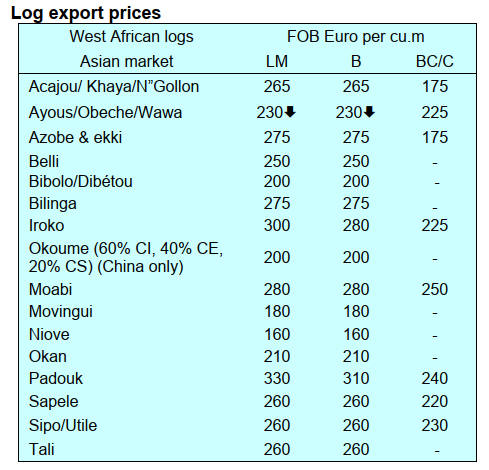
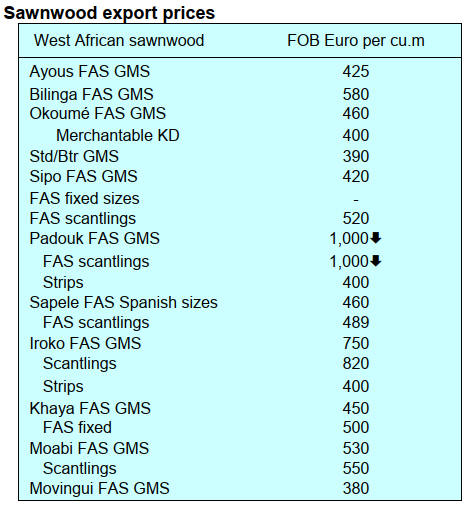
2.
GHANA
Billet exports tumble
Ghana experienced a decline in wood product exports in
the first seven months of this year. The Timber Industry
Development Division (TIDD) reported an almost 10%
drop in export volumes and a 6% drop in earnings
compared to the same period for previous year.
In its report for the first seven months of the year the
TIDD recorded 182,367 cu.m of wood product exports
compared to 201,776 cu.m in the same period last year.
The total export value for the first seven months of 2023
was Eur82.29 million compared to Eur87.75 million in the
same period in 2022.
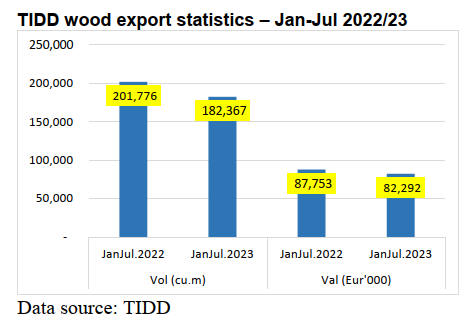
TIDD wood export statistics – Jan-Jul. 2022/2023
In spite of the dip in volume and value of the wood
product exports the data showed five (5) products that
recorded some improvements in export volumes during the
period. These included rotary veneer (3.7%), mouldings
(13%), plywood (73%), briquettes and kiln dried boules.
The main exporter of briquettes was Sustainable Biomass
Solution Ghana Limited. The company was the sole
exporter shipping 1,192 cu.m of their product earning
Eur214,719 during the first 7 months of 2023. The only
species used for this product was wawa with the United
Kingdom as the only market. The average unit price
(AUP) for briquettes for the period reviewed fell to
Eur175.79/cu.m compared to Eur252.30/cu.m in 2022.
The products for which export volumes declined
significantly were billets which dropped to 9,162 cu.m in
the first seven months of this year from 24,404cu.m in the
same period in 2022, a massive 63% decline. The
corresponding revenue also fell by 63%, from Eur 7.72
million in in the first seven months of last year to Eur 2.82
million in the current year.
The top species for billet production were teak and
gmelina which accounted for 94% and 6% respectively of
the total export volume for the first seven months of 2023.
This product is mainly shipped to India (96%) and the
United Kingdom (4%).
Ghana’s Primary Products, which comprised billet and
teak logs, earned Eur4.75 million from a total volume of
15,124 cu.m of the total wood products exports in the first
seven months of 2023. The figures represent decreases of
38% in value and volume compared to the timber export
figures registered during January-July 2022 which were
24,404 cu.m (12%) valued at Eur7.72 million (8.80%).
ECOWAS Market – higher average prices despite drop
in volume
Of total wood products export the first seven months of
2023, eleven ECOWAS countries accounted for
18,707cu.m, which earned the country Eur7.18 million in
2023 as against 26,375cu.m valued at Eur7.26million in
2022.
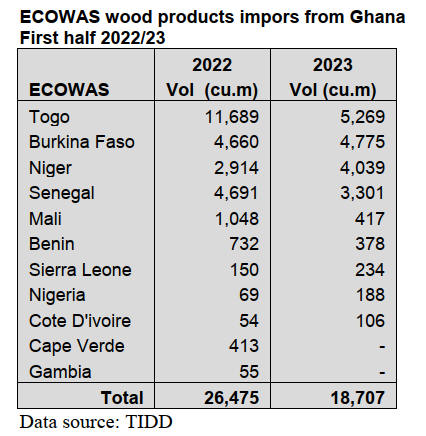
The 2023 ECOWAS import volumes and values resulted
in a higher average unit price (AUP) of Eur383.75/cu.m
compared to Eur274.28/cu.m for the same period last year.
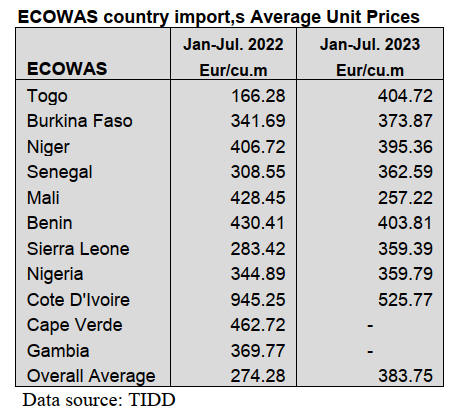
According to TIDD data the ECOWAS sub-region market
registered the largest share of 18,707cu.m representing
82%, valued at Eur 7.18 million (77%) of the total African
wood products exported from Ghana during the first seven
months of 2023 as compared to Eur7.26 million recorded
during JanJul.2022.
In a related development, available data from the United
Nations Conference on Trade and Development
(UNCTAD) on the African Continental Free Trade Area
(AfCFTA) show that, as of January this year, intra-Africa
trade was low at just 14.4% of total African exports.
Countries trading under the AfCFTA regime, which
commenced in January 2021, have been urged to fashion
out a deliberate policy decisions to increase intra-African
trade and investment, grow local businesses to accelerate
industrialisation.
See:
https://thebftonline.com/2023/08/24/brics-2023-deliberate-policy-decisions-advocated-to-drive-intra-african-trade/
Training on performance management systems
The Forestry Commission (FC) organised Performance
Management System (PMS) training for eighteen senior
staff at the Forestry Commission Training Centre (FCTC)
at Akyawkrom in the Ashanti Region.
The resource person for the training, the Director of
FCTC, Andy Okrah, explained that Performance
Management is a strategic and integrated process that
delivers sustained success to an organisation by improving
performance of employees and developing their
capabilities.
He indicated that, some of the objectives of the workshop
were to provide an insight into FC’s Performance
Management Systems, develop the capacity of employees
in target setting for effective implementation of FC’s PMS
and teach how to set targets under FC’s PMS.
Participants were schooled on how to set targets using the
SMART Model, which states that; a target should be
Specific, Measurable, Attainable, Realistic and Timely.
Mr. Okrah explained that, one must first identify his key
job areas in order to set a ‘SMART’ target and per the
Forestry Commission PMS (target setting), employees are
to set 5-8 goals in general, which should be derived from
employee’s technical, personality and managerial
competencies. He coached participants on what makes a
target SMART.
Participants were taken through a practical and interactive
session to demonstrate how to have a face-to-face
discussions with subordinates on their targets and give
unbiased feedback on their strengths and weakness, skills
attitude, job knowledge and behaviour at work.
See: https://fcghana.org/?p=4086
Ghana-Turkey trade projected to hit US$1 billion
The Ghana-Turkey Chamber of Commerce has hinted the
annual value of trade between Ghana and Turkey could
rise to US$900 million by 2025 which will subsequently
exceed the US$1 billion mark by the close 2027.
According to the Chamber, as of 2020 the total trade value
between Ghana and Turkey stood at US$771 million, from
a progressive growth of US$479 million in 2016. In 2019,
Ghana became Turkey’s third-biggest trading partner in
sub-Saharan Africa taking a dip in 2021 and 2022 due to
the global economic slowdown.
The Chief Executive Officer of the Chamber, Dr. Daniel
Amateye Anim-Prempeh, stated that, while the current
trend of trade between the two nations is promising,
improving relations and expanding areas of trade
guarantee that it will grow at a faster rate. According to
TIDD statistics, Turkey’s imports from Ghana include air-
dried, kiln-dried, rotary veneer and processed
lumber/mouldings wood products.
See:
https://thebftonline.com/2023/09/18/ghana-turkey-trade-to-hit-us1bn-in-2027/
Meanwhile, according to the September 2023 Bank of
Ghana (BoG) summary of macroeconomic and financial
data, Ghana’s trade balance grew by about 13% from the
US$1.78 billion in July 2023 to US$2.01 billion in August
2023, which represented 2.6% of GDP.
See:
https://www.bog.gov.gh/wp-content/uploads/2023/09/Summary-of-Economic-Financial-Data-September-2023.pdf
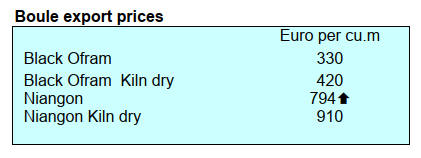 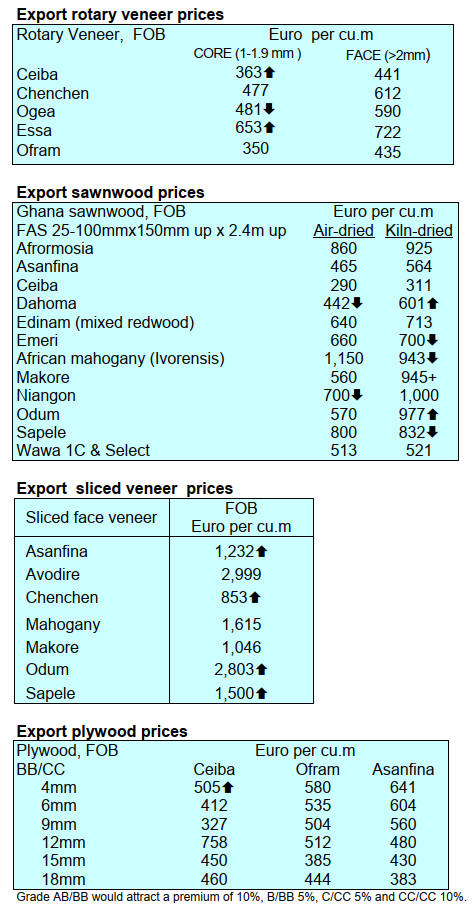
3. MALAYSIA
Sarawak company looses forest
certification certificate
The Malaysian logging company Samling has lost its
forest certification certificate for the Ravenscourt Forest
Management Unit (FMU), one of its certified natural
forests under the Malaysia Timber Certification Scheme
(MTCS) in Sarawak.
The certification body SIRIM withdrew the certificate
after Samling failed to provide effective corrective action
to address issues of non-compliance with the MTCS
standard. There are currently no logging on-going
activities in the Ravenscourt FMU.
See:
https://borneoproject.org/as-trial-looms-samling-loses-forest-certificate-in-sarawak/
US furniture wholesaler
US-based ‘Top-Line Furniture Corporation’, a large
furniture importer and wholesaler based in Chicago,
Illinois has expressed an intention to increase its imports
from Malaysia over the next few years to RM230 million
per year.
The company has been sourcing home furnishings from
Malaysia since 2000 with total imports amounting to
approximately RM840 million to date. The increase in
imports will not only benefit Malaysian furniture
manufacturers but also benefit companies along the supply
chain.
Malaysia’s furniture exports in 2022 totalled RM13.86
billion with the US being its top export market at RM7.24
billion or 52% of total furniture exports last year. For the
first six months this year Malaysia’s furniture exports
were RM4.07 billion, of which 49% went to the US.
Production of highly-marketable bamboo products
should be prioritised
The bamboo industry possesses immense potential to be
developed and used as an alternative to timber according
to Deputy Prime Minister. He added, bamboo is an
abundant natural resource and Malaysia is home to about
70 bamboo species with 45 being local species found in
Malaysian forests.
He said that although export earnings from bamboo are
small compared to other forest products, bamboo has the
potential to be developed and used as an alternative to
wood in a variety of applications. The production of
highly-marketable bamboo products should be prioritised.
Currently there are some 577 industries actively involved
in the industry through sectors such as furniture,
construction, textiles, plantations, food, charcoal (bamboo
briquettes) and handicraft. To effectively spur the national
bamboo industry, a more effective and holistic approach
must be taken to create a conducive environment. The
Forest Research Institute Malaysia (FRIM) has conducted
extensive research on bamboo since the 1980s.
FRIM is committed to commercialisation activities as one
of its main sources of revenue through products and
technologies developed by its scientists. Its Innovation and
Commercialisation Division Director, Mohd Salleh, said
FRIM’s Research and Development projects successfully
produced potential outputs in various forms such as
products, processes, formulations, designs and plant
varieties.
He said that all the institute’s intellectual property was
developed by FRIM scientists using local bio-resources
which are suitable for the climatic environment and
applications as well as meet industry standards and market
requirements.
See:
https://www.thestar.com.my/news/nation/2023/09/22/fadillah-vast-potential-for-bamboo-industry-to-grow
FRIM to mainstream commercialisation
Supporting Nature-based Solution projects in Malaysia
In a press release, PETRONAS has announced the
company and the Malaysia Forest Fund (MFF) have
signed a Memorandum of Understanding (MoU) to
explore and develop high-quality Nature-based Solutions
(NBS) projects in Malaysia.
NBS comprise all activities related to the conservation and
restoration of natural ecosystems to lower the
concentration of greenhouses gases in the atmosphere. It
offers immediate, scalable and cost-effective pathways to
reduce net emissions, as well as contributes to climate
mitigation and community co-benefits.
Given its importance in addressing the climate and nature
crises, the selection of NBS projects must be of high
quality with strong environmental integrity drivers and
additional co-benefits, assessed and verified by credible
framework and international standards.
PETRONAS' participation in the REDD Plus initiative
also signifies its commitment to conducting and expanding
its business in a manner that generates positive
contributions to both society and the environment, thereby
strengthening PETRONAS’ stance on nature and
biodiversity.
See:
https://www.petronas.com/media/media-releases/petronas-partners-malaysia-forest-fund-explore-high-quality-nature-based
4.
INDONESIA
Foreign partners offer
way of diversifying international
marketing
During the 2023 Indonesia Furniture and Design Expo in
Tangerang, Banten the Indonesian President urged
Indonesian furniture makers to look for foreign partners as
a way of diversifying international marketing.
He said that the domestic furniture industry is ranked 17th
in the world with a total revenue of only US$2.8 billion
amid the world furniture market potential of almost
US$800 billion.
In related news, the President said that the government
will continue to encourage the furniture and crafts sectors
so they become more competitive with imported products
in the domestic market. He added that domestic products
should be marketed through the internet which will attract
private as well as government buyers.
The President said he is confident that domestic
manufacturers have a great future in the domestic market.
HIMKI Collaboration with CNFMA
The Indonesia Furniture Industry and Crafts Association
(HIMKI) intends to collaborate with the China National
Forestry Machinery Association (CNFMA) to promote
appropriate wood processing technology for the furniture
industry.
HIMKI General Chairperson, Abdul Sobur, explained that
both HIMKI and CNFMA appreciate the relationship
between technological developments and the success of
the furniture industry. According to Sobur, the impact of
technology in the furniture and crafts sectors is undisputed
as this can raise production efficiency and process
precision.
In addition machine technology can expand the
possibilities for furniture design. Designers can
experiment with new materials and shapes knowing that
modern machines can deliver with precision. Sobur
commented that machining technology has changed the
furniture and crafts industry by enabling mass production,
increased efficiency and precision, has encouraged
innovation and customisation and contributing to
sustainability efforts.
In related news, The HIMKI is working with the China
Foreign Trade Guangzhou Exhibition General Corp, the
organiser of the China International Furniture Fair, to
expand Indonesia’s share of the furniture market in China.
See:
https://en.antaranews.com/news/293631/jokowi-indonesia-furniture-industry-needs-foreign-partners
and
https://agroindonesia.co.id/tingkatkan-daya-saing-produk-furnitur-himki-gandeng-cnfma/
Furniture sector exports declined in first half
of 2023
Data from Indonesia’s Central Statistics Agency shows
exports all types of furniture (except plastic furniture)
weakened in the first half of 2023. In the first half of this
year the total volume of national furniture exports reached
253,500 tonnes, down 26% compared to the first half of
2022. In the same period export earnings from furniture
exports also fell (-31%) to US$1.07 billion.
In the first half of 2023 the largest export earnings were
delivered by wooden furniture, reaching US$731.1
million. However, this was 32% below the value of
wooden furniture exports in the same period in 2022.
The main export markets for Indonesian wooden furniture
were the United States, Japan, the Netherlands, Germany,
Belgium, Australia, England, France, Canada and Spain.
However, in the first semester of 2023, almost all
countries reduced their imports.
The value of wooden furniture exports to Japan fell 25%,
the Netherlands (-40%), Germany (-47%), Belgium (-
23%), Australia (-42%), the UK (-27%), France (-13%)
and Canada (-58%). The only wooden furniture market
country that increased purchases was Spain but the
increase was only around 3%.
See:
https://databoks.katadata.co.id/datapublish/2023/09/15/ekspor-furnitur-indonesia-melemah-baik-bahan-kayu-maupun-plastik
and
https://databoks.katadata.co.id/datapublish/2023/09/15/negara-pasar-utama-furnitur-kayu-ri-kurangi-belanja-pada-semester-i-2023
Forest owners welcome biomass co-firing concept
Indonesian forest owners have welcomed the biomass co-
firing programme planned by coal fired power plants
saying they are ready to supply wood chips if long-term
contracts can be agreed.
The chairperson of the Association of Indonesia Forest
Concession Holders (APHI), Indroyono Soesilo, stated
that energy plantation forests could replace at least 5% of
the coal currently consumed.
Soesilo said the forestry sector sees attractive prospects in
biomass co-firing.Energy plantation forests can supply
wood chips from Gamal and Kaliandra trees which can be
harvested in two years. He added the biomass price plan
should be 1.2 times higher the price of coal to encourage
the forest growers.
The Ministry of Environment and Forestry (KLHK) has
said Indonesia has forest resources that can be utilised for
the biomass-based green energy sector. The KLHK
supports biomass utilisation programmes by promoting
plantation forests for energy along with utilisation of wood
waste.
See:
https://www.msn.com/id-id/berita/other/industri-hutan-harapkan-kontrak-jangka-panjang-untuk-pasok-wood-chips/ar-AA1gHAg6
and
https://ekonomi.republika.co.id/berita/s12o2y457/klhk-sebut-indonesia-punya-hutan-yang-potensial-untuk-biomassa
Lower threat of forest, land fires
Rasio Ridho Sani, Director General of Law Enforcement
at KLHK has reported the threat of forest and land fires
this year is much lower than in previous years. According
to Sani, the number of forest and land fire cases that often
occur in Sumatra and Kalimantan had decreased because a
team constantly conducts satellite monitoring of hotspots
and raises the alarm.
See:
https://en.antaranews.com/news/294201/threat-of-forest-land-fires-continue-to-decrease-ministry
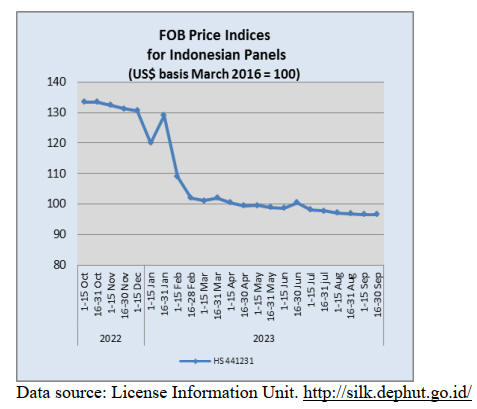
5.
MYANMAR
Timber export performance reported
The value of timber exports in the first five-month of
2023-2024 declined year on year to around US$30 million.
This downward trend is likely to continue such that the
year-end figure for exports could be around US$75million.
The value of timber exports was US$128 million for the
financial year 2021-22 and US$139 million for 2022-23
according to the Ministry of Commerce.
The impact of sanctions imposed by the US and EU and
the latest measures taken against the state-owned banks,
Myanmar Foreign Trade Banks and Myanmar Investment
and Commercial Bank has weakened the country’s ability
to export wood products. Millers report there are no orders
from the US or EU.
According to the State-Owned Newspaper ‘The Global
New Light of Myanmar’, Dr Than Naing Oo, Deputy
Director-General of Forest Department, was quoted as
saying “Between April and July of this financial year
Myanmar’s teak found its way to 20 countries through 41
companies in 242 containers totalling 2,610 cubic tons.
The export revenue amounted to US$8.137 million.”
India, Singapore, Malaysia, Thailand and China were
reportedly the main markets for timber from Myanmar.
Alarming fluctuations in exchange rates
In recent weeks there have been alarming fluctuations in
exchange rates in Myanmar and this has had a knock-on
impact on prices of household essentials. In an effort to
gain control of money markets the Central Bank of
Myanmar (CBM) announced it had revoked the licenses of
a further 123 currency exchange companies raising the
number of licenses revoked within the last 11 months to
168.
The CBM took similar actions last October and this year
in January, March, July and August against a total of 45
companies including Myanmar National Airlines saying
the companies had failed to comply with the bank’s rules
and directives.
The CBM cited the same reason for its latest move to
revoke currency exchange permits. Companies whose
licenses were revoked on Tuesday included trading firms,
travel & tour operators, construction groups, hotels
including Yangon’s luxury Sedona Hotel and financial
services companies.
The CBM’s current reference exchange rate is 2,100 kyats
per US dollar although the black market rate went over
3,500 Kyats at the end of August 2023.
See:
https://www.irrawaddy.com/business/junta-shutters-myanmar-currency-exchanges-in-futile-bid-to-prop-up-economy.html
Government re-shuffle
In another development Myanmar’s military has
reshuffled the country’s ruling council (State
Administration Council) and Cabinet, state media
reported, with an apparent purge of two high-ranking
generals who independent media have said are under
investigation for alleged corruption.
See:
https://apnews.com/article/myanmar-army-corruption-cabinet-reshuffle-9e2a235d2e4cc31b17a2e42f6bf12a31
and
https://www.irrawaddy.com/business/myanmar-junta-continues-tightening-the-screws-on-its-economic-team.html
)
Running out of power: World Bank report
Myanmar’s power sector has been in a downward spiral
since the February 2021 military take-over and the
prolonged electricity blackouts will likely worsen
according to a recent World Bank report and a former
advisor to the Myanmar Ministry of Electricity and
Energy.
Major cities, including Yangon, Mandalay, and Naypyitaw
are facing regular power outages while industrial zones
across the country are bracing for crippling power cuts and
surging fuel prices says the World Bank report “In The
Dark: Power Sector Challenges in Myanmar.”
UN calls for a unified strategy to end the worsening
crisis in Myanmar
UN Secretary-General António Guterres, said financial aid
should be boosted to previous levels to enable the world
body to respond to an “enormous tragedy.” He said the
situation in Myanmar has further deteriorated since he met
with ASEAN leaders in a 2022 summit and again called
on the Myanmar government to immediately free all
political prisoners and “open the door to a return to
democratic rule.” Guterres made the case for an
international response in a news conference before joining
the Association of Southeast Asian Nations leaders’
summit meetings in Indonesia.
See:
https://www.asahi.com/ajw/articles/15000256#:~:text=U.N.,the%20worsening%20crisis%20in%20Myanmar.
and
https://apnews.com/article/asean-myanmar-united-nations-antonio-guterres-c0b88922566e879ca816206d94666eeb
6.
INDIA
Some wood product prices
dip lower
The annual rate of inflation based on the all India
Wholesale Price Index (WPI) in August was minus 0.52%
compared to minus 1.32% recorded in July 2023. The
decline in the rate of inflation in August 2023 was
primarily due to a decline in prices for mineral oils, basic
metals, chemicals and chemical products, textiles and food
products.
Out of the 22 NIC two-digit groups for manufactured
products, 15 groups saw an increase in prices whereas for
6 groups there was a decline in prices.
The increase in price was mainly contributed
by food
products; electrical equipment; computers, electronic and
optical products; other manufactures and motor vehicles.
The groups for which prices dropped were paper and paper
products; machinery and equipment; fabricated metal
products; pharmaceuticals and furniture.
https://eaindustry.nic.in/pdf_files/cmonthly.pdf
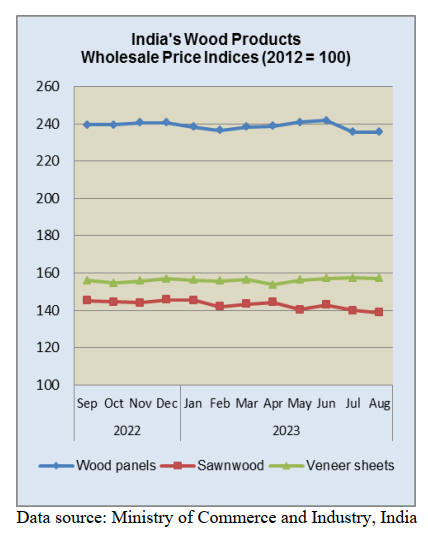
Expanding forest plantations
The Indian government is encouraging the expansion of
forest plantations and at the same time reviewing the
regulations on their management and finances as this will
boost the country's mission for clean and green growth as
well as providing long-term benefits to the environment
and economy.
The Prime Minister was quoted as saying “bringing
together 'prakriti' (nature) and 'pragati' (development) has
been the hallmark of the ‘New India’ development model.
The PM said the involvement of local communities in the
plantation drive will deliver a sense of ownership and
environmental stewardship.
See:
https://www.thehindubusinessline.com/news/national/will-boost-indias-mission-for-clean-green-growth-pm-modi-lauds-assam-govts-mega-plantation-drive/article67317635.ece
In related news, the first meeting of the Wood
Industries
Committee of India (WINCOIN) under the chairmanship
of the Director-General, ICFRE (Indian Council of
Forestry Research & Education) was held at the Institute
of Wood Science and Technology. Attending were around
140 participants including industrial members,
representatives of wood industries associations, officials,
scientists and scholars.
The ICFRE-WINCOIN can be a unique platform
comprising of all wood industry associations along with
officials and Scientists that would bring synergy to the
field of wood science, tree improvement and research. In
his inaugural address Dr. A.S. Rawat, Director General,
ICFRE, emphasised the need to explore domestic species
and said he will work closely with the wood based
industries.
During Open-end discussion the Director of Institute of
Forestry Products, Ranchi, reported that the institute has
developed clones of poplar especially for North Bihar
State area and extensive planting of poplar has been
carried out by farmers. Representative from Institute of
Forest Genetics and Tree Breeding (IFGTB) said poplar,
eucalyptus and melia dubia are being used for plywood
manufactire.
See:
https://iwst.icfre.gov.in/wincoin/wincoin%20meeeting%20brochure%2021%20July%20_21%20July2023.pdf
and
https://plyinsight.com/the-first-meeting-of-icfre/
Success of big conglomerates obscures pressures
on
smaller businesses
According to the World Trade Organisation, small-and
medium-sized enterprises (SMEs) represent over 90% of
the business population, account for 60-70% of
employment and 55% of GDP in developed economies. In
developing countries SMEs are the heart of the
manufacturing sector.
Nowhere is this more apparent than in India according to
Sunil Kant Munjal, an Indian businessman and the
chairman of Hero Enterprise.
He said “For India to grow we need more and more of our
small businesses to mature into large firms”, Some Indian
economist say India’s growth and the rapid expansion of
the country’s biggest conglomerates has obscured the
pressures on smaller businesses.
According to the Mumbai-based fund manager Marcellus,
20 companies took 80% of the profits generated by the
Indian economy in 2022. By contrast, in a February survey
of more than 100,000 small business owners by the
Consortium of Indian Associations, three-quarters of
respondents reported they were not profitable and one-
third claimed their business’ performance had declined
over the past five years.
One of the first recent challenges for small business was
demonetisation which resulted in the elimination of
circulation of Rs500 and Rs1,000 notes, the core of SME
trading, which overnight rendered 86% of India’scurrency
notes unusable.
The SMEs (the so-called unorganised sector) had almost
recovered from demonetisation when the Goods and
Services Tax was introduced. This disrupted the economy
for a considerable time.
The unorganised sector was desperately trying to get back
on its feet when in 2020 yet another road block appeared
in the form of a covid lockdown implemented within four
hours of the announcement bringing the country to a
standstill.
See:
https://www.ft.com/content/ef93bf55-4273-4090-add0-ed7d1d16353c
and
https://qz.com/india/2095466/demonetisation-gst-covid-lockdown-wrecked-indias-small-tradersanda/2095466/demonetisation-gst-covid-lockdown-wrecked-indias-small-traders
Attracting foreign investment to expand furniture
exports
The Trade Promotion Council of India (TPCI) and the
World Furniture Confederation (WFC) agreed a MoU
aimed at establishing furniture industrial clusters in India.
The MoU was signed during the Annual General Meeting
of the World Furniture Confederation in Dongguan, China.
Representing India was Mohit Singla, Chairman of
the Trade Promotion Council of India. TPCI is currently
headed by Xu Xiangnan, President of the China National
Furniture Association.
Singla, commented that “the MoU will promote
engagement with global major furniture manufacturers,
promote ‘Make in India’ for domestic and export markets
and is the first signal of global cooperation in the
organised furniture sector for India”.
He added that this cooperation is expected to
attract foreign investment, enhance India's furniture
exports and reduce the country's dependency on furniture
imports.
See:
https://www.cnbctv18.com/business/india-trade-council-joins-forces-with-global-body-to-boost-furniture-manufacturing-17572141.htm
and
https://www.furniturenews.net/news/articles/2019/06/1868205500-world-furniture-confederation-expands-membership
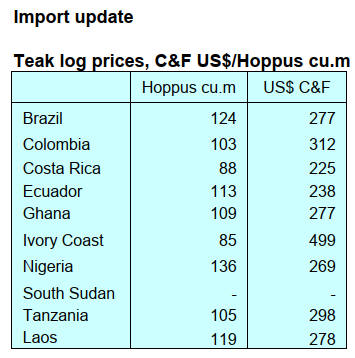 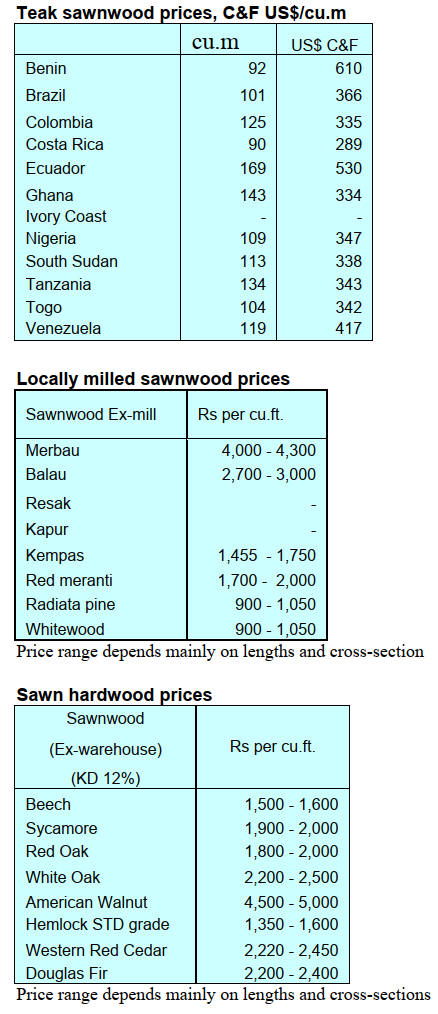
Plywood
Price increases for plywood are currently being discussed,
any changes will be reported as soon as they are available.
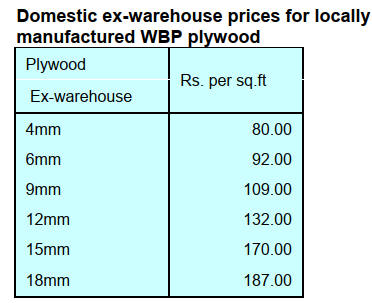 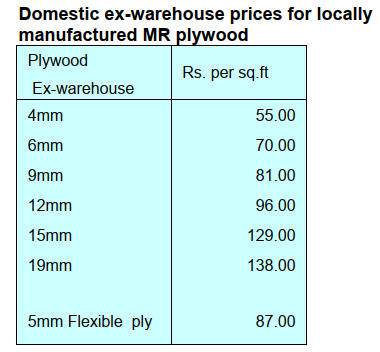
7.
VIETNAM
Wood and Wood Product (W&WP) trade highlights
The General Department of Customs has reported W&WP
exports to India in August 2023 reached US$13.8 million,
up by more than x3 compared to August 2022.
In the first 8 months of 2023 W&WP exports India were
valued at US$64.9 million. While W&WP exports to key
markets such as the US, EU and China have been
declining, growth in the Indian market is expected to offer
opportunities for Vietnamese exporters.
Vietnam’s W&WP exports to Taiwan P.o.C in August
2023 were reported at US$5.1 million, down 63%
compared to August 2022. Over the first 8 months of 2023
W&WP exports to this market were worth US$44.4
million, down 47% over the same period in 2022.
Vietnam's W&WP imports in August 2023 amounted to
US$185.3 million, down 3% compared to July 2023 and
down 35% compared to August 2022.
In the first 8 months of 2023 W&WP imports were
valued
at US$1.416 billion, down 34% over the same period in
2022.
Logs and sawnwood imports from the US in August 2023
totalled 45,000 cu.m, at a value of US$19.0 million, up
2.3% in volume and 6% in value compared to July 2023.
Over the first 8 months of 2023 the total volume of
imports from the US was 351.900 cu.m at a value of
US$150.64 million, down 23% in volume and 31% in
value over the same period in 2022.
Vietnam’s W&WP exports to Canadia in August 2023
earned US$15 million, down 29% compared to August
2022. In the first 8 months of 2023 the W&WP exports to
Canada were valued at US$122 million, down 31% year-
on-year.
Cameroon remains as the largest supplier of tropical
hardwood sharing 69.5% of total tali wood imports to
Vietnam in the first 7 months of 2023 reaching 170,900
cu.m, worth US$73.0 million, down 1.7% in volume and
1.9% in value over the same period in 2022.
General situation of Vietnam’s tali wood imports
According to preliminary statistics, Vietnam's tali wood
imports in August 2023 reached 33,900 cu.m, worth
US$13.1 million, up 3.6% in volume and 2.7% in value
compared to July 2023; Compared to August 2022, it
decreased by 44.8% in volume and 48.3% in value. Over
the first 8 months of 2023, tali wood imports accumulated
at 279,100 cu.m, worth US$115.9 million, down 20.0% in
volume and 19.2% in value over the same period in 2022.
In the first 7 months of 2023 imports of tali logs were at
125,400 cu.m, worth US$59.1 million, up 4.4% in volume
and 8.4% in value over the same period in 2022. Imports
of tali sawnwood were 120,600 cu.m, worth US$44.1
million, down 28% in volume and 31% in value over the
same period in 2022.
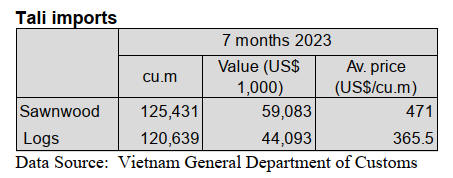
Tali price fluctuations
The average price of tali imported into Vietnam in the first
7 months of 2023 stood at US$419.3 per cu.m, up 2.2%
over the same period in 2022. In particular, the price of tali
from Cameroon increased by 3.6% against that of the last
year to US$426.8/cu.m; from Congo up by 5.2% to
US$456.7/cu.m; from Nigeria by 4.8% to US$255.3/cu.m.
Log and sawnwood imports from the US to regaining
growth
Statistics provided by Vietnam’s General Department of
Customs showed that log and sawnwood imports from the
US in July 2023 amounted to 43,980 cu.m, with a value of
US$17.88 million, down 6% in volume and 13% in value
compared to June 2023 and down 47% in volume and 55%
in value compared to July 2022.
In the first 7 months of 2023 imports of logs and
sawnwood from the US totalled at 306,900 cu.m, at
US$131.64 million, down 17% in volume and 27% in
value over the same period in 2022.
The raw material Vietnam imported from the US in
August 2023 increased to reach 45,000 cu.m, with a value
of US$19 million, up 2.3% in volume and 6.3% in value
compared to July 2023.
In the recent months as W&WP export orders have shown
positive signals in key markets the demand for legally-
sourced wood from trusted suppliers such as the US and
EU is expected to recover.
The average price of imported US sawnwood in July 2023
stood at US$469 per cu.m, up by 0.4% compared to June
2023 but down by 31.3% against July 2022.
In the first 7 months of 2023 the average
price of
sawnwood imported from the US was US$481 per cu.m,
down by 26% over the same period in 2022.
Log imports from the US July 2023 averaged
US$305/cu.m, down by 23% compared to June 2023 but
up by 17% compared to the same period in 2022. In the
first 7 months of 2023 the average price of logs imported
from the US stood at US$337/cu.m, up 22% over the same
period in 2022.
Imports from the EU forecasted to increase
Imports of logs and sawnwood from the EU in July 2023
amounted to 87,840 cu.m, worth US$27.23 million, down
2.9% in volume and 0.4% in value compared to June 2023
but up 17% in volume and 4.5% in value over the same
period in 2022. In the first 7 months of 2023, imports of
wood from the EU totaled at 443,010 cu.m, worth
US$135.60 million, down 6.1% in volume and 13.8% in
value year-on-year.
New market opportunities
Although Vietnam’s wood industry is still facing many
difficulties W&WP exports have shown positive signals
with orders coming from key markets such as the US and
Europe and businesses are likely regaining consumers.
This lead to increased demand for imported wood raw
material for the manufacture value-added products for
export. Imports of roundwood and sawnwood from the EU
are expected to increase slightly from now to the end of
2023.
India and Middle East offer new opportunity for
Vietnam’s timber exporters.
With the sharp fall in exports of wood products to
traditional and well-established markets such as the US,
China, Japan, South Korea and the EU, India and the
Middle East are emerging as new opportunities for
Vietnamese exporters.
According to the Vietnam Timber and Forest Products
Association (VIFOREST) Vietnam’s wood export orders
for the US in the first half of the year fell by around 30%
depending on product categories, while those for the EU
market also shrank by up to 40%.
India and the Middle East are becoming prospective
markets for Vietnamese wood products although revenue
remains low with no large and long-term orders.
India is not Vietnam’s main timber export market but
customs data showed export earnings in the early months
of 2023 had already reached US$21 million, three times
higher than the same period last year. Vietnam’s main
export to India is medium-density fiberboard (MDF)
which accounted for 47% of total exports.
Similarly, Vietnam’s wood exports to Middle Eastern
countries also witnessed strong growth with revenues from
the United Arab Emirates up by 38% to US$11 million.
The main exports to this market were construction
wood,
chairs and other wooden items.
But according to enterprise leaders the tastes in the Indian
market are different from that of the European and US
markets as their favoured products are not being
manufactured by Vietnam. For now only the younger
consumers are using products similar to western countries.
For the Middle East there was an increased demand for
construction wood in the early months of the year some
were facing difficulties in securing timber from their
traditional suppliers due to economic and political
uncertainties.
Although their purchases remain limited the Middle East’s
rising import of Vietnamese timber is offering new hopes
for Vietnamese enterprises amidst the current crisis.
VIFOREST Chairman Do Xuan Lap said the US is still
the most important market for Vietnamese timber. To
increase the competitive advantage in this market
Vietnamese enterprises need to review their strategic
products and look into products with high levels of
potential with which they have a competitive edge.
For the Indian market wood enterprises need to learn about
the demand for MDF and other wood products. Regarding
the Middle East they need to conduct thorough surveys of
the potential for exports to these markets and the products
which are in demand.
See:
https://en.nhandan.vn/india-and-middle-east-offer-new-opportunity-for-vietnams-timber-exporters-post127890.html
National plan on implementation of Glasgow
Declaration on forests
Vietnam will closely manage natural forests and gradually
deal with forest and land degradation as set in the national
plan recently approved by Deputy Prime Minister Tran
Luu Quang on the implementation of the Glasgow
Leaders’ Declaration on Forests and Land Use.
The declaration was launched at the United Nations
Climate Change Conference (COP26) in November 2021.
A total of 143 nations signed the declaration, accounting
for over 90% of the world’s forests. This effort aimed to
“halt and reverse forest loss and land degradation by 2030
while delivering sustainable development and promoting
inclusive rural transformation.”
The national plan by 2030 is intended to realise goals of
sustainable agricultural and rural development, greenhouse
gas emission reduction, climate change response,
biodiversity conservation, sustainable forest management,
and transition to a green economy and a circular economy.
Under the plan, the area of downgraded natural forests
restored and upgraded is set at 10% by 2025, and 20% by
2030. In addition, the forested area to be certified for
sustainable forest management is expected to reach 0.5
million hectares by 2025, and 1 million hectares by 2030.
Vietnam will perfect mechanisms and policies to promote
sustainability in agro-forestry production and consumption
and raise resilience of forest land to climate change.
Efforts will be made to improve rural livelihoods by
empowering local communities, consolidating land
management systems and improving the multi-purpose
management of forests.
The plan also aims to promote the access to, and efficient
use of domestic and international financial resources as
well as public-private partnership in agro-forestry
production and sustainable forest management, and
support local residents, especially of ethnic minority
groups.
See:
https://en.vietnamplus.vn/national-plan-issued-to-implement-glasgow-declaration-on-forests-land-use/266949.vnp
8. BRAZIL
Mato Grosso leads national
production of traceable
native wood
According to the Brazilian Institute of Geography and
Statistics (IBGE) the forest-based sector in the state of
Mato Grosso in the Amazon Region has grown to become
the leading national roundwood producer with production
of over 4 million cubic metres per year. Harvesting
through Sustainable Forest Management Plans (PMFS)
includes approximately 50 native tree species.
In addition, the forest-based sector is among the ten
industrial segments that provide the most tax revenue in
Mato Grosso with R$66.2 million being collected by the
State government in 2022.
In addition to the economic impact and the significant
concentration of micro and small companies (67.8% in
Mato Grosso's forest-based sector), the sector also stands
out as an important generator of jobs with an annual
increase of 18% in the wage bill according to the
Federation of Industries in the State of Mato Grosso
(FIEMT).
After the COVID-19 crisis in 2019 and 2020 the sector
returned to growth in 2022 with a growth rate of 43%
compared to 2021 and contributied significantly to the
local economy (almost half of Mato Grosso's
municipalities (47%) have forestry industries).
In addition, the Center for Timber Producing and
Exporting Industries of the State of Mato Grosso (CIPEM)
has highed the importance of the new Document of Forest
Origin (DOF) system. The mandatory DOF+ traceability
permit is a tool for issuing, managing and monitoring the
transport and storage of forest products from tree species
native to Brazil. The system ensures standardised practices
and a high levels of environmental responsibility.
See: cipem.org.br/noticias/segmento-florestal-de-mt-lidera-producao-nacional-de-madeira-nativa-rastreada
Castanha-do-brasil shows great potentiali n
recovering
degraded land
Embrapa research carried out in the Amazon region
indicates that castanha-do-brasil (the Brazil nut tree,
Bertholletia excelsa) is a useful species for recovering
degraded lands and is a promising solution for forest
restoration.
Brazil nut trees are capable of producing for more than 40
years with little or no nutrient input, contributing to
environmental preservation and providing economic
opportunities for local communities. Studies show that the
soil under Brazil nut tree stands recover in a similar way to
soils in the natural forest.
According to the Food and Agriculture Organization
Brazil is the world's largest producer of Brazil nuts with
around 33,000 tonnes produced every year. In Fazenda
Aruanã, located in the municipality of Itacoatiara in the
state of Amazonas, there are the largest Brazil nut
plantations in the world with around 1.3 million trees. This
planted area of 3,000 hectares, became the largest Brazil
nut plantation in the world and was established on
degraded pasture land.
See:
http://www.remade.com.br/noticias/19459/castanheira-da-amazonia-mostra-eficiencia-na-recuperacao-de-solos-degradados
Export update
In August 2023 the value of Brazilian exports of wood-
based products (except pulp and paper) dropped 26%
compared to August 2022, from US$404.0 million to
US$299.8 million.
Pine sawnwood exports declined 29% in value between
August 2022 (US$74.6 million) and August 2023
(US$53.2 million). In volume, exports decreased 9.5%
over the same period, from 254,200 cu.m to 230,100 cu.m.
Tropical sawnwood exports also dropped 26% in volume,
from 35,700 cu.m in August 2022 to 26,300 cu.m in
August 2023. In value, exports decreased 22% from
US$16.2 million to US$12.6 million over the same period.
In contrast, pine plywood exports recorded a 4% increase
in value in August 2023 compared to August 2022, from
US$50.6 million to US$52.8 million. In volume terms,
exports increased 32% over the same period, from 127,400
cu.m to 168,500 cu.m.
Tropical plywood exports declined in volume by 54% and
in value the decline was 60% from 5,200 cu.m and US$3.7
million in August 2022 to 2,400 cu.m and US$1.5 million
in August 2023.
As for wooden furniture the exported value decreased
from US$60.9 million in August 2022 to US$54.0 million
in August 2023, an 11% drop.
Challenges facing the wood panel industry in Brazil
According to the Brazilian Tree Industry (IBÁ), in the
second quarter of 2023 consumption of wood based panels
(particleboard/MDP, MDF/HDF and hardboard) in Brazil
fell by 1.4% compared to the same period last year, from
1.74 million cu.m to 1.72 million cu.m.
In addition, exports of Brazilian wood-based panels in the
first half of 2023 totaled US$144.8 million representing a
significant drop of 48% compared to the US$277.9 million
exported in the first half of 2022.
Latin American countries continued to be the main
regional export markets for Brazilian panels in the first
half of 2023 with US$80.4 million (US$126.0 million in
2022) a reduction of 36%, followed by the North
American market at US$33.5 million, which also
presented a considerable reduction of 69%, compared to
US$107.1 million in 2022.
The volumes exported by Brazilian wood panel
manufacturers fell by 42.0% in the first half of 2023
totaling 499,000 cu.m compared to the 861,000 cu.m
exported in the first half of 2022.
See:
http://www.remade.com.br/noticias/19437/consumo-e-exportacao-de-paineis-de-madeira-brasileiros-caem-no-1%C2%BA-semestre-de-2023
Brazil at forefront in development of technology
for the
forestry sector
Brazil stands out as a leader in the development of
technological solutions for the forestry sector. According
to the Indústria Brasileira de Árvores (IBÁ) the average
productivity of eucalyptus has reached its highest level
since 2014 at 38.9 cu./ha/year in 2021 while pine reached
29.7 cu.m/ha/year.
This level of productivity is above the global average and
was achieved by investment in technology. Today, it is not
just large companies that realise the importance of
investment but small and medium-sized companies have
also been taking advantage of the benefits that innovative
solutions bring to production.
The technologies developed have enabled more efficient
sustainable forest management. New software makes it
possible to analyse data collected in order to solve
problems and continuously improve processes, resulting in
greater productivity and profitability.
Despite challenges such as infrastructure connectivity
Brazil continues to boost forest productivity and
strengthen its leadership in the development of technology
for the forest sector through partnerships and exchange of
knowledge.
See:
https://www.madeiratotal.com.br/impulsionador-de-produtividade-brasil-e-referencia-no-desenvolvimento-de-tecnologia-para-o-setor-florestal/
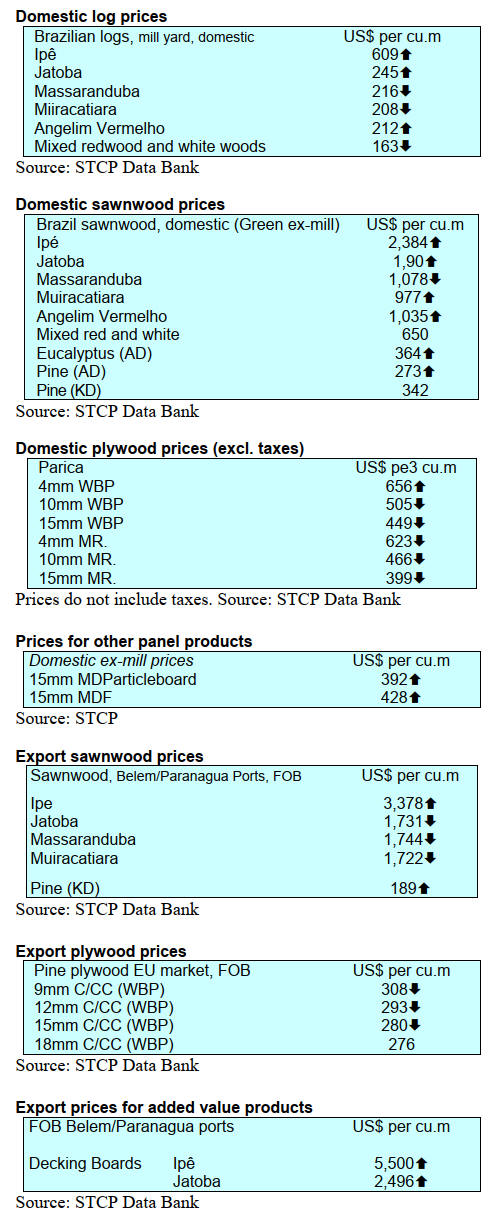
9. PERU
Export shipments of
wooden furniture fall
The export of wooden furniture and parts between January
and July 2023 were valued at US$2.1 million, a year on
year contraction of 22% as reported by the Association of
Exporters (ADEX).
Despite a 25% drop in orders the US was its main buyer of
wooden furniture at US$1.2 million or 59% of total
wooden furniture exports. In the period January to July
2022 exports to the US were worth US$ 1.6 million.
Other furniture markets were Italy (US$0.19 million), a
slight increase of 0.6% and Chile (US$0.15 million), a
drop of 50%. Completing the top ten export markets were
El Salvador (US$0.12 million), Spain (US$93,061),
Guatemala (US$85,796), Ecuador (US$1,165), Bermuda
(US$53,324), Trinidad and Tobago (US$47,995) and
Aruba (US$ 6,415).
In terms of categories the main export was of ‘other’
wooden furniture (US$1.02 million)accounting for 50%
despite suffering a decline of 369% compared to the same
period in 2022 .
Also shipped was wooden bedroom furniture (US$0.36
million), seats with padding and wooden frames (US$0.25
million), other seats with wooden frames (US$ 0.24
million) and wooden furniture used in offices. (US$0.13
million).
Wooden furniture and its parts ranked fifth among all
categories of wooden furniture exported between January
and July, or 4% of the total. These products earned less
than sawn wood (US$25.1 million), semi-manufactured
products (US 4.4 million), construction products (US$3.2
million) and firewood and charcoal (US$2.6 million). In
2022 shipments of wooden furniture and parts totalled
US$4.6 million, a year on year growth of 7%.
Unified databases to protect forest resources
The governor of Ucayali, Manuel Gambini and the
Director of the National Forest Service (Serfor), Luis
González, signed a protocol that seeks to strengthen the
management of information between both institutions with
the aim of making the management of forest resources in
Ucayali more efficient.
The document served to establish agreements that will
bring benefits to the region. All the information on the
respective geoportals will be available to the public. The
governor indicated that indigenous peoples will be the
main beneficiaries.
Gonzáles maintained that what has been established is an
information tool that will contribute to management with
the objective of unifying the GORE-Ucayali database with
that of Serfor to ensure the availability of the information
in a transparent manner.
Serfor approves timber control protocol for river
transport
In order to exercise complete control of the transport of
forest products the National Forestry and Wildlife Service
(Serfor) approved a protocol 'Timber control in river
transport'. This came into force through an Executive
Directorate Resolution No. D000210-2023-MIDAGRI-
SERFORDE published in the Legal Standards of the
Official Gazette El Peruano.
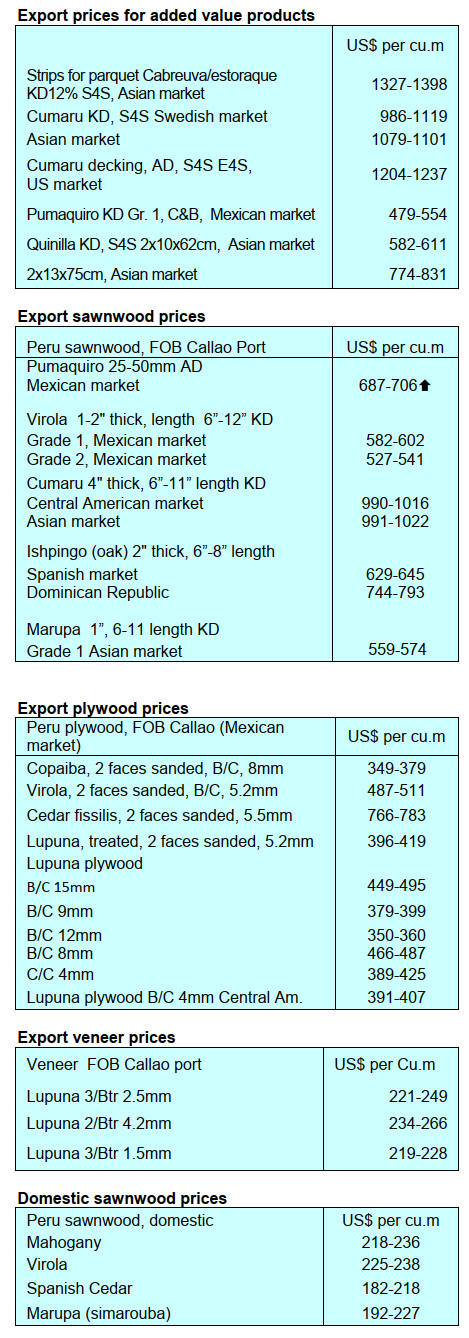
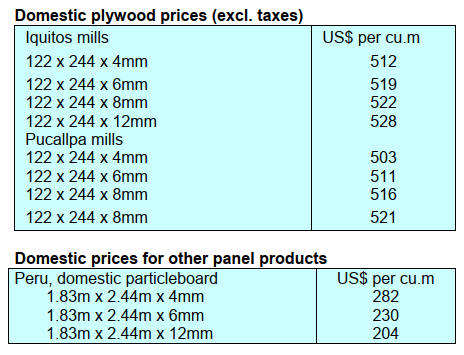
|